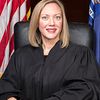Michigan Supreme Court elections, 2020
 From Ballotpedia - Reading time: 24 min
From Ballotpedia - Reading time: 24 min
| 2020 State Judicial Elections | |
|---|---|
2021 »
« 2019
| |
 | |
| Overview | |
| Supreme Courts Overview | |
| Appellate Courts Overview | |
| View judicial elections by state: | |
Seven candidates ran in the general election for two seats on the Michigan Supreme Court on November 3, 2020. The two seats were held by Bridget Mary McCormack and Stephen Markman, a Republican-appointed justice who had reached his mandatory retirement age and was not eligible to run for re-election.
Justice McCormack held her place as Chief Justice, and Elizabeth Welch (D) won Justice Markman’s seat. The partisan balance on the court flipped to 4-3, with Democrats controlling the court. At the time of the election, four of the seven justices on the court were appointed by Republican governors to fill vacancies. Three of the justices on the court advanced from Democratic conventions before winning general elections.
Although the general election is nonpartisan, political parties in Michigan may nominate candidates for state supreme court elections. The Democratic Party nominated incumbent Bridget Mary McCormack and Elizabeth Welch, the Republican Party nominated Brock Swartzle and Mary Kelly, and the Libertarian Party nominated Kerry Lee Morgan and Katie Nepton. A seventh candidate, Susan L. Hubbard, was not nominated by a political party. The Democratic and Republican nominating conventions took place on August 29, 2020.
Election procedure changes in 2020[edit]
Ballotpedia provided comprehensive coverage of how election dates and procedures changed in 2020. While the majority of changes occurred as a result of the coronavirus (COVID-19) pandemic, some changes occurred for other reasons.
Michigan modified its absentee/mail-in voting procedures for the November 3, 2020, general election as follows:
- Absentee/mail-in voting: Absentee ballot applications were sent to all registered voters in the general election.
For a full timeline about election modifications made in response to the COVID-19 outbreak, click here.
Judges with expiring terms[edit]
- This is a list of the justices who had to stand for nonpartisan election in 2020 in order to remain on the bench. Justices could choose not to stand for election.
■ Stephen Markman - Note: Markman reached the mandatory retirement age of 70 years and was not eligible to run for re-election.
■ Bridget Mary McCormack ![]()
Candidates and election results[edit]
General election for Michigan Supreme Court (2 seats)
The following candidates ran in the general election for Michigan Supreme Court on November 3, 2020.
Candidate |
% |
Votes |
||
| ✔ |
|
Bridget Mary McCormack (Nonpartisan) 
|
32.3
|
2,377,410 |
| ✔ |
|
Elizabeth Welch (Nonpartisan) 
|
20.2
|
1,490,550 |
|
|
Mary Kelly (Nonpartisan) |
17.0
|
1,252,692 | |
|
|
Brock Swartzle (Nonpartisan) |
13.7
|
1,009,320 | |
|
|
Susan L. Hubbard (Nonpartisan) 
|
8.3
|
611,019 | |
|
|
Kerry Lee Morgan (Nonpartisan) 
|
4.6
|
340,396 | |
|
|
Katie Nepton (Nonpartisan) |
3.9
|
290,377 | |
| Total votes: 7,371,764 | ||||
 = candidate completed the Ballotpedia Candidate Connection survey. = candidate completed the Ballotpedia Candidate Connection survey. | ||||
Do you want a spreadsheet of this type of data? Contact our sales team. |
||||
Candidate profiles[edit]
This section includes candidate profiles created in one of two ways. Either the candidate completed Ballotpedia's Candidate Connection survey or Ballotpedia staff created a profile after identifying the candidate as noteworthy.[1] Ballotpedia staff compiled profiles based on campaign websites, advertisements, and public statements.

Incumbent: Yes
Political Office:
- Michigan Supreme Court (Assumed office: 2013)
Biography: Prior to her election to the court, McCormack was a law professor and dean at the University of Michigan Law School. While an associate dean, McCormack co-founded the law school's Innocence Clinic. She was a faculty fellow at Yale Law School. She also served as an attorney with the Legal Aid Society and the Office of the Appellate Defender in New York. McCormack received her J.D. from New York University Law School.
![]()
Show sources
This information was current as of the candidate's run for Michigan Supreme Court in 2020

Incumbent: No
Political Office: None
Submitted Biography: "I began my legal career 25 years ago, practicing employment law first with two large law firms and then started my own practice in 2004. My current work has focused heavily upon COVID-19 in the workplace, safety issues, and unemployment issues. I also have handled criminal law matters and abuse/neglect matters and have worked extensively as an unpaid advocate on issues involving conservation, voting rights, and public education. I have served on the boards of numerous non-profit and advocacy organizations in Michigan. I currently serve as Vice President of the Steelcase Foundation, Trustee on the Grand Valley University Foundation, and am a member of the School Finance Research Collaborative (which studied the true cost to educate a child in Michigan). My past service includes Vice President of my local Board of Education, board/leadership positions with the Grand Rapids Bar Association, Women Lawyers, and the Michigan League of Conservation Voters, and election protection work with NAACP WIN and the GR Mayor's Task Force. My husband, Brian Schwartz, and I have four kids in our blended family. Our oldest son is a United States Air Force Academy graduate (now serving), and our other two sons and daughter are in college."
![]()
This information was current as of the candidate's run for Michigan Supreme Court in 2020

Incumbent: No
Political Office: None
Biography: Kelly worked over 30 years as a prosecutor in St. Clair County. She also worked in private practice as a general practitioner with emphasis on domestic matters, civil litigation, and criminal matters. She argued cases before the United States District Court and the United States Court of Appeals.
![]()
Show sources
This information was current as of the candidate's run for Michigan Supreme Court in 2020

Incumbent: No
Political Office: None
Biography: Swartzle worked as chief of staff for the speaker of the Michigan House of Representatives and general counsel for the house. He was litigation partner with Honigman Miller Schwartz and Cohn LLP. Swartzle was also a law clerk for three years in both the Eastern District of Michigan and the Western District of Michigan. He clerked for David McKeague on the U.S. Court of Appeals for the Sixth Circuit for four years.
![]()
Show sources
Sources: Brock Swartzle's 2020 campaign website, "Meet Brock," Accessed October 7, 2020; Brock Swartzle's 2020 campaign website, "Opinions," accessed October 7, 2020; Brock Swartzle's 2020 campaign website, "Why I Write," accessed October 7, 2020; Michigan Courts, "Fourth District Judges," accessed October 7, 2020.
This information was current as of the candidate's run for Michigan Supreme Court in 2020

Incumbent: No
Political Office: None
Submitted Biography: "Kerry is Of Counsel to Pentiuk, Couvreur & Kobiljak, P.C. His chief areas of practice involve municipal law, employment discrimination, civil rights, labor law litigation, environmental law, educational policy and federal firearms law. Kerry has extensive experience in matter related to labor law, where he has worked zealously with municipal and business clients to resolve disputes. In addition to advising parents on their tights in connection with the home education of their children, Kerry has also written a number of thought-provoking articles in the areas of natural law and unalienable rights. He completed an extensive legal review of religious liberty principles and Supreme Court cases titled, Unalienable Rights, Equality and the Free Exercise of Religion. In 1997, University Press of America published his book, Real Choice, Real Freedom in American Education, a scholarly work that articulates the legal and Constitutional case for parental rights and against governmental control of American Education. Kerry also engages in pro-bono work by advising parents on their rights in connection with the home education of their children. Prior to his current legal affiliation, he served as an Attorney-Advisor with the United States Commission on Civil Rights in Washington, D.C. he also served as the Director of the U.S. Bicentennial Project for Regent University."
![]()
This information was current as of the candidate's run for Michigan Supreme Court in 2020

Incumbent: No
Political Office: None
Biography: Nepton received her JD in transactional law from Thomas M. Cooley Law School and her bachelor's in international relations and political science from the University of Connecticut. She worked as a victim advocate for the Bureau & Putnam County Health Department from 2007 through 2008.
![]()
Show sources
This information was current as of the candidate's run for Michigan Supreme Court in 2020

Incumbent: No
Political Office: None
Submitted Biography: "Judge Susan L. Hubbard has served on the Wayne County Circuit Court for the past ten years. She created the first instructional video for self-represented litigants in family cases who cannot afford attorneys, providing real access to justice. As a Wayne County Commissioner, Hubbard authored the county's first Ethics Ordinance against corruption and the county's first Airport Noise Abatement Program which resulted in the re-development of Detroit-Metro Airport in 2003. As a member of the Dearborn City Council, Hubbard authored ordinances protecting residential neighborhoods from industrial encroachment. Judge Hubbard rejects the politicization of the courts and believes strongly in applying the Rule of Law to each case and protecting our Constitution. Hubbard supported herself through college and law school graduating from Wayne State University and the Detroit College of Law. She began her career with the U.S. General Accounting Office where she audited federal programs ensuring for efficiency and testified at Congressional hearings on their effectiveness. "
![]()
This information was current as of the candidate's run for Michigan Supreme Court in 2020
Campaign finance[edit]
Noteworthy events[edit]
Michigan House of Representatives and Michigan Senate v. Gretchen Whitmer[edit]
On May 6, 2020, Republicans in the Michigan House and Senate filed a lawsuit challenging Gov. Gretchen Whitmer's (D) emergency declarations issued related to coronavirus. The lawsuit alleged that Whitmer exceeded her authority under two laws that formed the basis of her emergency declaration—the 1976 Emergency Management Act and the 1945 Emergency Powers of the Governor Act.[2]
On May 21, Court of Claims Judge Cynthia Diane Stephens ruled against the Michigan legislature, dismissing the lawsuit. She wrote that Gov. Whitmer exceeded her authority under the 1976 law but not the 1945 law.[3]
On May 22, the Legislature asked the state Supreme Court to take up the case.[4]
On October 2 the Michigan Supreme Court ruled in a 4-3 decision that Gov. Whitmer had no authority to issue or renew executive orders relating to Covid-19 beyond April 30. Justice Markman wrote the majority opinion. [5] Justices Brian K. Zahra, Elizabeth Clement, and David F. Viviano joined the majority. Justices Bridget M. McCormack, Richard H. Bernstein, and Megan K. Cavanagh dissented. [6]
About the Michigan Supreme Court[edit]
- See also: Michigan Supreme Court
The Michigan Supreme Court is the court of last resort in Michigan. The court is located in the Michigan Hall of Justice in Lansing, the state capital. There are seven justices on the court, one being the chief justice. Justices are elected to eight-year terms or appointed by the governor in the case of a vacancy. Most commonly, the court takes appeals from the Michigan Court of Appeals. It is also responsible for the administration and supervision of all lower courts in the state.[7]
Past elections[edit]
2018[edit]
- See also: Michigan Supreme Court elections, 2018
Although the general election was officially nonpartisan, candidates were nominated to the ballot by party convention. Party affiliation listed below refers to the party that nominated each candidate.
General election for Michigan Supreme Court (2 seats)
The following candidates ran in the general election for Michigan Supreme Court on November 6, 2018.
Candidate |
% |
Votes |
||
| ✔ |
|
Elizabeth Clement (R) |
29.9
|
1,871,462 |
| ✔ |
|
Megan Cavanagh (D) |
25.3
|
1,584,512 |
|
|
Kurtis Wilder (R) |
24.3
|
1,519,394 | |
|
|
Samuel Bagenstos (D) |
11.5
|
717,062 | |
|
|
Kerry Lee Morgan (L) |
5.8
|
360,858 | |
|
|
Doug Dern (Natural Law Party) |
3.3
|
209,103 | |
| Total votes: 6,262,391 | ||||
 = candidate completed the Ballotpedia Candidate Connection survey. = candidate completed the Ballotpedia Candidate Connection survey. | ||||
Do you want a spreadsheet of this type of data? Contact our sales team. |
||||
Click [show] at the right to view more past election results. | |||||||||||||||||||||||||||||||||||||||||||||||||||||||||||||||||||||||
|---|---|---|---|---|---|---|---|---|---|---|---|---|---|---|---|---|---|---|---|---|---|---|---|---|---|---|---|---|---|---|---|---|---|---|---|---|---|---|---|---|---|---|---|---|---|---|---|---|---|---|---|---|---|---|---|---|---|---|---|---|---|---|---|---|---|---|---|---|---|---|---|
2016
| |||||||||||||||||||||||||||||||||||||||||||||||||||||||||||||||||||||||
Political composition[edit]
This was the political composition of the supreme court heading into the 2020 election.
| ■ Richard Bernstein | Elected in 2014 | |
| ■ Megan Cavanagh | Elected in 2018 | |
| ■ Elizabeth Clement | Appointed by Gov. Rick Snyder (R) in 2017 | |
| ■ Stephen Markman | Appointed by Gov. John Engler (R) in 1999; elected in 2004 and 2012 | |
| ■ Bridget Mary McCormack | Elected in 2012 | |
| ■ David Viviano | Appointed by Gov. Rick Snyder (R) in 2013; elected in 2014 and 2016 | |
| ■ Brian Zahra | Appointed by Gov. Rick Snyder (R) in 2011; elected in 2012 and 2014 |
Selection[edit]
- See also: Judicial selection in Michigan
The seven justices of the Michigan Supreme Court are chosen in nonpartisan elections. They serve eight-year terms and must be re-elected if they wish to continue serving.[8] Incumbent judges seeking re-election may file an affidavit of candidacy requesting to be placed on the ballot, while non-incumbent candidates must either file a nominating petition or obtain a partisan nomination at a party convention. Incumbency is noted on the ballot, though party affiliation is not.[8]
In the event of a midterm vacancy, the governor appoints a temporary replacement to serve until the next general election. At the governor's request, the state bar's standing committee on judicial qualifications interviews, evaluates, and rates all candidates, submitting a confidential report to the governor.[8]
Qualifications[edit]
In order to be elected to this court, a judge must:
- be a qualified elector;
- be licensed to practice law in the state;
- have at least five years of law practice experience;
- be under the age of 70.[8]
Sitting judges who reach age 70 are allowed to serve out the remainder of their term.[9]
Selection of the chief justice[edit]
The chief justice of the court serves a two-year term and is elected by his or her fellow justices.[8]
See also[edit]
External links[edit]
Footnotes[edit]
- ↑ Candidate Connection surveys completed before September 26, 2019, were not used to generate candidate profiles. In battleground primaries, Ballotpedia based its selection of noteworthy candidates on polling, fundraising, and noteworthy endorsements. In battleground general elections, all major party candidates and any other candidates with the potential to impact the outcome of the race were included.
- ↑ The Detroit News, "Michigan House, Senate sue Gov. Whitmer, call emergency powers 'invalid'," May 6, 2020
- ↑ CNN, "Judge dismisses Michigan Legislature's lawsuit over governor's use of emergency powers," May 21, 2020
- ↑ The Detroit News, "Legislature asks Michigan Supreme Court to consider emergency powers case," May 26, 2020
- ↑ "CNN", "Michigan State Supreme Court Whitmer Emergency Powers," October 7, 2020
- ↑ Michigan Supreme Court , Recent Opinions, October 23, 2020
- ↑ Michigan Courts, "About the Supreme Court," accessed October 29, 2014
- ↑ 8.0 8.1 8.2 8.3 8.4 American Judicature Society, "Methods of Judicial Selection: Michigan," archived October 2, 2014
- ↑ Michigan Daily, "Washtenaw County judge announces early retirement," May 1, 2014
Federal courts:
Sixth Circuit Court of Appeals • U.S. District Court: Eastern District of Michigan, Western District of Michigan • U.S. Bankruptcy Court: Eastern District of Michigan, Western District of Michigan
State courts:
Michigan Supreme Court • Michigan Court of Appeals • Michigan Circuit Court • Michigan District Courts • Michigan Probate Courts
State resources:
Courts in Michigan • Michigan judicial elections • Judicial selection in Michigan
| ||||||||||
 KSF
KSF

















